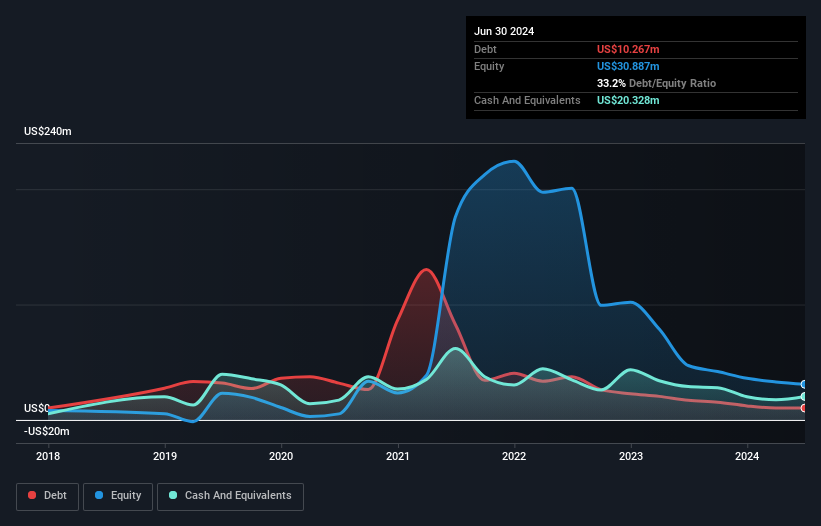Is Aterian (NASDAQ:ATER) A Risky Investment?
David Iben put it well when he said, 'Volatility is not a risk we care about. What we care about is avoiding the permanent loss of capital.' When we think about how risky a company is, we always like to look at its use of debt, since debt overload can lead to ruin. As with many other companies Aterian, Inc. (NASDAQ:ATER) makes use of debt. But should shareholders be worried about its use of debt?
What Risk Does Debt Bring?
Generally speaking, debt only becomes a real problem when a company can't easily pay it off, either by raising capital or with its own cash flow. Part and parcel of capitalism is the process of 'creative destruction' where failed businesses are mercilessly liquidated by their bankers. However, a more common (but still painful) scenario is that it has to raise new equity capital at a low price, thus permanently diluting shareholders. Of course, the upside of debt is that it often represents cheap capital, especially when it replaces dilution in a company with the ability to reinvest at high rates of return. When we examine debt levels, we first consider both cash and debt levels, together.
View our latest analysis for Aterian
How Much Debt Does Aterian Carry?
As you can see below, Aterian had US$10.3m of debt at June 2024, down from US$17.0m a year prior. But it also has US$20.3m in cash to offset that, meaning it has US$10.1m net cash.

A Look At Aterian's Liabilities
The latest balance sheet data shows that Aterian had liabilities of US$28.7m due within a year, and liabilities of US$277.0k falling due after that. On the other hand, it had cash of US$20.3m and US$3.76m worth of receivables due within a year. So its liabilities outweigh the sum of its cash and (near-term) receivables by US$4.87m.
Aterian has a market capitalization of US$20.5m, so it could very likely raise cash to ameliorate its balance sheet, if the need arose. However, it is still worthwhile taking a close look at its ability to pay off debt. Despite its noteworthy liabilities, Aterian boasts net cash, so it's fair to say it does not have a heavy debt load! When analysing debt levels, the balance sheet is the obvious place to start. But ultimately the future profitability of the business will decide if Aterian can strengthen its balance sheet over time. So if you're focused on the future you can check out this free report showing analyst profit forecasts.
In the last year Aterian had a loss before interest and tax, and actually shrunk its revenue by 37%, to US$121m. That makes us nervous, to say the least.
So How Risky Is Aterian?
By their very nature companies that are losing money are more risky than those with a long history of profitability. And we do note that Aterian had an earnings before interest and tax (EBIT) loss, over the last year. Indeed, in that time it burnt through US$1.7m of cash and made a loss of US$23m. But the saving grace is the US$10.1m on the balance sheet. That kitty means the company can keep spending for growth for at least two years, at current rates. Summing up, we're a little skeptical of this one, as it seems fairly risky in the absence of free cashflow. When analysing debt levels, the balance sheet is the obvious place to start. But ultimately, every company can contain risks that exist outside of the balance sheet. For example, we've discovered 5 warning signs for Aterian that you should be aware of before investing here.
If you're interested in investing in businesses that can grow profits without the burden of debt, then check out this free list of growing businesses that have net cash on the balance sheet.
Have feedback on this article? Concerned about the content? Get in touch with us directly. Alternatively, email editorial-team (at) simplywallst.com.
This article by Simply Wall St is general in nature. We provide commentary based on historical data and analyst forecasts only using an unbiased methodology and our articles are not intended to be financial advice. It does not constitute a recommendation to buy or sell any stock, and does not take account of your objectives, or your financial situation. We aim to bring you long-term focused analysis driven by fundamental data. Note that our analysis may not factor in the latest price-sensitive company announcements or qualitative material. Simply Wall St has no position in any stocks mentioned.
 Index Options
Index Options CME Group
CME Group Nasdaq
Nasdaq Cboe
Cboe TradingView
TradingView Wall Street Journal
Wall Street Journal